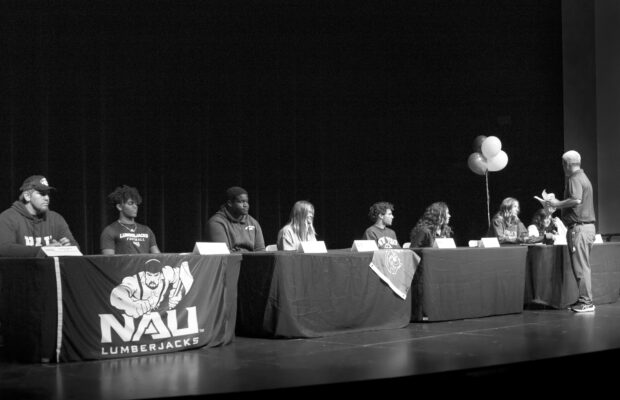Athletes sign away their next four years

As the pen hits the paper, several athletes watch as their next four years are signed into contract. With the hectic season of college applications out of the way, many assume that committed athletes can sit back and enjoy the second semester of their senior year. This, however, is far from the truth. Instead, students must continue to train and prepare for the intense switch from playing on a high school team to that one college campus, surrounded by new coaches, environments and teammates.
As children, many set their sights on certain “dream” schools, and spend the rest of their pre-college academic career doing whatever it takes to get accepted. Applications with a high GPA, good extracurriculars and a strong essay, can also be boosted by strong athletic ability. Asa Fletcher, senior, recently committed to New York University [NYU] for Cross Country and Track and Field for the 2024-2025 school year, which has been a dream of his since childhood. “I would always just go to the city as a kid and knew that it was a dream school in a sense, and so that led to the decision of putting it up on the list and then just between conversations with the coach and the team and atmosphere, I realized it was a perfect fit,” Fletcher said.
There are years of dedication and hard work that go into achieving a table on Signing Day. Maddy Byrne, senior, committed to California Polytechnic State University in San Luis Obispo for Beach Volleyball, and explains the complex process behind beginning college on a sports team. “Signing day is when you formally commit to a school and you have to play there for at least a year. The experience was really exciting for me because it made it all feel real. You want to get your name in coaches’ heads so that they recognize you at showcases. Another thing is to play tournaments, recruiters don’t care as much about how you finish in a tournament if you’re not playing against quality competition,” Byrne said.
While many originally plan to pursue their sport in college simply for the love of their sport, athletes may find that there are other benefits, primarily, lifting the weight of daunting college tuition. “[I am looking forward] to getting my schooling paid for. NYU is expensive, so just being able to run by being an athlete, that pays for itself,” Fletcher said.
Many signing athletes have been forced to conclude that they will have to leave behind many of Newbury Park’s aspects that encouraged them to pursue their sport, however, Elyse Grant, senior, and future Cross Country runner for Embry-Riddle Aeronautical University has hopes that the atmosphere will remain similar. “I hope it’s just like high school, [with] a close team aspect. It’s probably going to be harder, but I hope that I still enjoy it and that it’s not too much to the point where I overwork myself or burn out,” Grant said.
Undeniably, countless hours and endless sacrifices go into getting to the level of college athleticism, but for many, it ends up being more rewarding than anything else. “Any athlete misses a lot of opportunities, whether it’s having a job or spending time with family, where you have to instead go out on runs before and after school. It’s just a lot of time to yourself, not a lot of practice with others, but it pays off,” Fletcher said. “Running has always kind of been this thing that kind of holds my life together. For a lot of athletes, it’s a big chunk of their lives and that can be good and bad, but just having some fun, and being able to rely on teammates, it’s always something that I’ve really enjoyed.”



